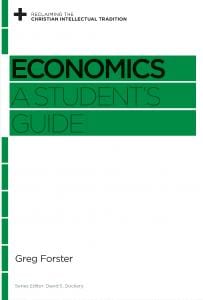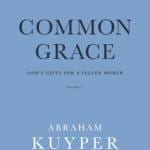There are multiple series out there of various kinds of guides for people looking to learn more about X subject or Y thinker from a Christian perspective. Greg Forster’s Economics: A Student’s Guide is a solid addition to Crossway’s series for those interested in beginning to think about economics.
With that said, if you’re looking for a book that gives the Christian defense of free markets, you’ll have to look elsewhere. Ditto if you’re looking for the Christian defense of government regulation of the marketplace.
Instead, what you’ll get is two chapters of theological foundation exploring the role of Scripture shaping our ideas about economics; three chapters of the history of how Christians have thought about economics (in the Ancient world, the Middle Ages, and the Modern world); and a chapter laying down broad outlines for thinking about economics in our own time.
In each of these chapters, Forster repeatedly calls for charity (since much has been shown to us) and civility (since we have received unmerited grace), and encourages us to listen to what other believers have to say before speaking ourselves. Likewise he teaches us how to think in broad contexts–both historical and current from multiple perspectives.

All of which should tell you that this is a solid little book, and a good overview of the field. I suspect the part that will frustrate people is that Forster pulls back from drawing any conclusions, which leaves the book feeling a bit incomplete given the nature of the subject matter. It’s certainly true that Christians should be civil and charitable–our sins have been forgiven by the gracious atonement of Christ without any merit from us, the least we can do is not be jerks to others (and that is the very least, certainly not a stopping point).
Still, at some point we do have to move beyond “listening” and “being kind” and actually make a real-world policy decision. That is, we must either (for example) have a minimum wage, or not have a minimum wage. We can’t have half a minimum age (though of course we could have one that is too low or too high, but a bad minimum wage is still having one). At the end of the day someone is going to win and someone is going to lose, and the fact that we have listened to each other might soften the blow for whoever doesn’t get their way in public policy but it won’t change the fact that their approach has been excluded. The question we have to answer is: which course ought to be excluded? As a Christian, I need to know whether a minimum wage is more in line with Biblical questions of justice and mercy, or less in line than not having one.
These are the kinds of points Forster steps back from making. Yes, Christians of good conscience can disagree with charity (and they should disagree in such a way, when disagreement is impossible to avoid!), but at some point votes must be cast.
So as I said, this is a great place to start thinking about economics. But it is certainly not the place to end such thought (and I suspect Forster would agree with me).
Highly recommended.
Dr. Coyle Neal is co-host of the City of Man Podcast and an Associate Professor of Political Science at Southwest Baptist University in Bolivar, MO












